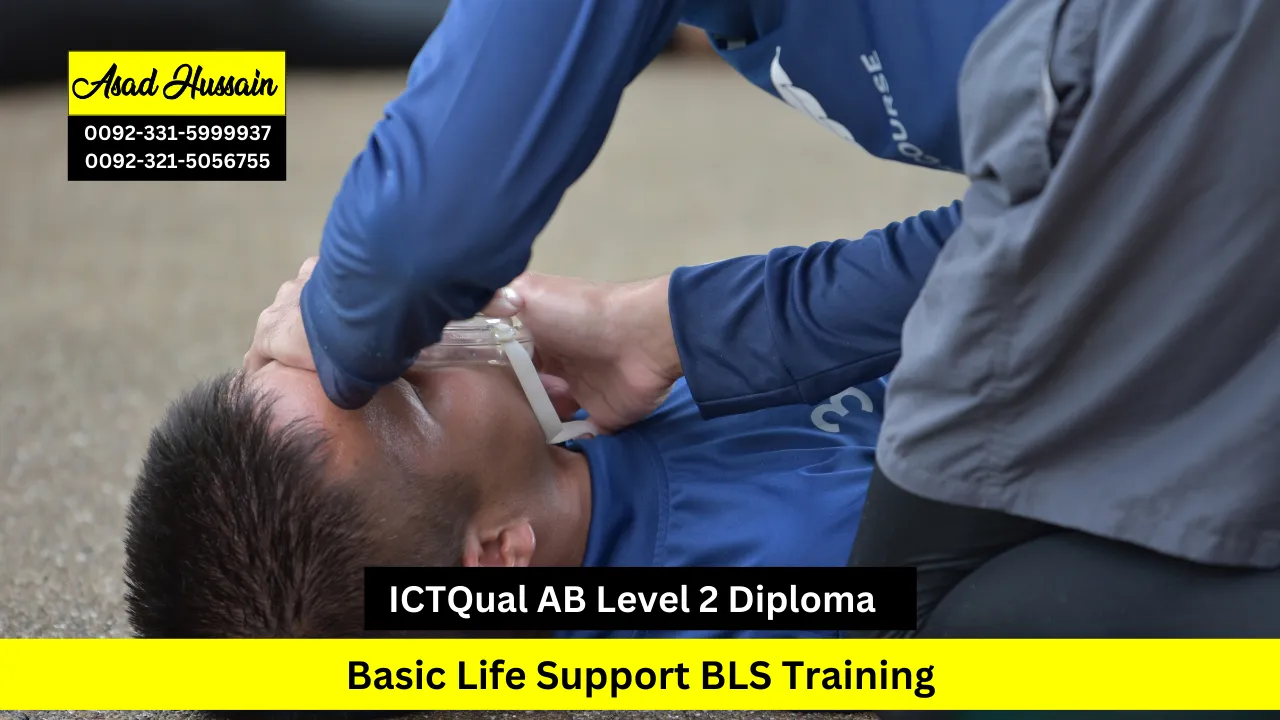Basic Life Support (BLS) is an essential skill that can save lives in emergencies such as cardiac arrest, choking, or respiratory distress. The ICTQual AB Level 2 Diploma in Basic Life Support (BLS) Training is designed for beginners and individuals seeking foundational knowledge and practical skills in emergency response. This entry-level program provides learners with the confidence and competence to act effectively in critical situations, whether in healthcare, workplace, or community environments.
The ICTQual AB Level 2 Diploma in Basic Life Support BLS Training covers key topics including cardiopulmonary resuscitation (CPR), airway management, automated external defibrillator (AED) usage, and emergency response procedures. Learners will gain practical experience through hands-on simulations and demonstrations, ensuring they can perform life-saving techniques safely and efficiently. The program also introduces learners to the principles of patient assessment, prioritization of care, and the chain of survival, fostering a strong understanding of how to respond appropriately in emergencies.
By completing ICTQual AB Level 2 Diploma in Basic Life Support BLS Training, participants will acquire the skills to assess emergency situations, perform chest compressions, deliver rescue breaths, and operate life-saving equipment in compliance with international standards. The curriculum emphasizes safety, ethical considerations, and adherence to professional guidelines, equipping learners with the confidence to act swiftly and responsibly during medical emergencies.
Graduates of the ICTQual AB Level 2 Diploma in Basic Life Support (BLS) Training will be prepared for entry-level first responder roles and will have a solid foundation for pursuing advanced life support training or further healthcare qualifications. ICTQual AB Level 2 Diploma in Basic Life Support BLS Training is ideal for anyone seeking to enhance their employability, contribute to safer environments, and develop practical skills that can make a real difference in saving lives.
Program Highlights
Study Units
- Life Support Techniques for Medical and Trauma Cases
- Advanced CPR, AED, and Oxygen Administration
- Pre-Hospital Care and Transportation
- Neurological Emergencies: Stroke, Seizures, and Head Trauma
- Respiratory and Cardiac Emergency Interventions
- Ethical and Legal Considerations in BLS
To enroll in the ICTQual AB Level 2 Diploma in Basic Life Support (BLS) Training, applicants should meet basic age, educational, and language requirements. These criteria ensure learners are prepared to understand fundamental life-saving concepts, follow practical instructions safely, and participate effectively in hands-on emergency response training.
Age Requirements
- Applicants must be at least 16 years old to enroll in the program.
- Learners below 18 may require parental consent or a guardian’s approval.
Educational Requirements
- No formal qualifications are required, making the course accessible to beginners.
- A basic understanding of health or science concepts is advantageous for comprehension.
Professional Experience for ICTQual AB Level 2 Diploma in Basic Life Support BLS Training
- No prior professional experience is necessary, allowing complete beginners to enroll.
- Individuals working in healthcare, first aid, or community safety roles can enhance their practical skills.
English Language Proficiency
- Learners should have a functional understanding of English to comprehend instructions and participate in practical activities.
- Non-native English speakers may provide evidence of basic proficiency through prior education or assessments.
The ICTQual AB Level 2 Diploma in Basic Life Support (BLS) Training equips learners with essential foundational skills and knowledge to respond confidently in emergency situations. Participants will gain practical abilities in life-saving interventions, emergency assessment, and safe execution of basic resuscitation techniques, preparing them for entry-level first responder roles.
Comprehensive Emergency Life Support
- Understand the principles of emergency life support and the chain of survival.
- Recognize signs of cardiac arrest, choking, and respiratory distress.
- Perform basic cardiopulmonary resuscitation (CPR) according to international guidelines.
- Apply initial assessment techniques to prioritize emergency actions.
- Respond effectively to common medical emergencies in various settings.
Advanced Airway and Respiratory Management
- Demonstrate correct techniques for airway clearance and basic respiratory support.
- Use adjunct airway tools safely in simulated scenarios.
- Monitor breathing and provide rescue breaths appropriately.
- Identify respiratory distress and take immediate corrective action.
- Ensure patient safety during airway management interventions.
Trauma Life Support and Multi-System Emergencies
- Identify and manage trauma cases with single or multiple injuries.
- Apply first aid techniques for bleeding control and immobilization.
- Recognize signs of shock and respond with appropriate measures.
- Prioritize care in multi-casualty or high-pressure situations.
- Understand the ethical considerations in trauma response.
High-Performance Resuscitation Techniques
- Perform chest compressions and rescue breaths effectively and safely.
- Operate automated external defibrillators (AEDs) correctly.
- Coordinate resuscitation efforts in team-based scenarios.
- Evaluate the effectiveness of resuscitation interventions.
- Adapt techniques to patients of different ages and conditions.
Pharmacological Interventions in Life Support
- Understand basic emergency medications and their intended use.
- Administer medications safely according to protocols (simulated practice).
- Monitor patient response to interventions.
- Identify possible adverse reactions and respond appropriately.
- Integrate medication use into emergency care procedures.
Leadership, Crisis Management, and Team Coordination
- Communicate effectively with team members during emergencies.
- Demonstrate leadership in organizing and delegating tasks.
- Make quick, informed decisions under pressure.
- Collaborate efficiently to optimize patient outcomes.
- Uphold professional standards and safety protocols during crises.
Conclusion
Upon completion of the ICTQual AB Level 2 Diploma in Basic Life Support (BLS) Training, learners will be confident in performing essential life-saving techniques, assessing emergency situations, and collaborating with teams to deliver safe and effective care. Graduates will be prepared for entry-level first responder roles and will have a strong foundation to pursue advanced life support training or further healthcare qualifications.
The ICTQual AB Level 2 Diploma in Basic Life Support (BLS) Training is designed for individuals who want to gain essential life-saving skills and foundational emergency response knowledge. This course is suitable for beginners and those seeking entry-level competence in healthcare, first aid, and community safety environments.
Educational Instructors and Trainers
- Instructors seeking to introduce students to basic life support concepts and emergency response procedures.
- Trainers aiming to build a strong foundational knowledge before teaching advanced life support courses.
Environmental Advocates and Activists
- Community safety personnel or volunteers who need emergency response skills to protect public health.
- Advocates involved in outreach programs and first aid awareness campaigns.
Students and Recent Graduates
- Learners new to healthcare or emergency response fields seeking practical, recognized BLS certification.
- Recent graduates aiming to enhance employability and develop life-saving skills for workplace or community readiness.
Career Changers
- Individuals transitioning from non-healthcare roles into first aid, safety, or basic emergency response positions.
- Professionals seeking foundational certification before pursuing further healthcare or life support training.
Policy Makers and Regulators
- Professionals responsible for implementing safety protocols or community health programs who need foundational BLS knowledge.
- Decision-makers requiring insight into emergency response standards to guide regulations and compliance.
Conclusion
This course is ideal for learners committed to acquiring practical, entry-level life-saving skills. Graduates will be prepared to respond confidently in emergencies, contribute to safer environments, and pursue further advanced training in basic and advanced life support or healthcare careers.







